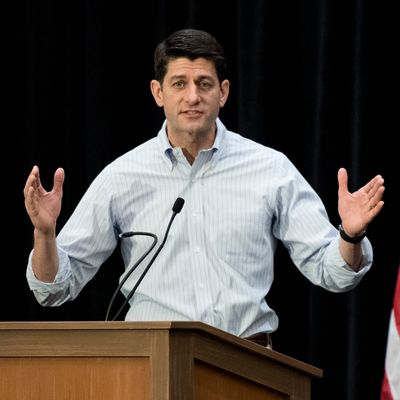
For seven years, Republicans campaigned and won on the message that Obamacare must be repealed and replaced as soon as possible. One month after unexpectedly finding themselves with a Republican in the White House and a majority in both chambers of Congress, it’s become apparent that Republicans aren’t going to quickly coalesce around a plan to overhaul the U.S. health-care system. The conservative House Freedom Caucus has vowed to oppose any repeal measure that’s less extreme than the one passed in 2015, while other Republican lawmakers have expressed concerns about forging ahead with a repeal plan that could leave millions with no coverage — especially after enduring raucous town hall events during last week’s recess.
Facing one of those angry left-leaning crowds in Iowa last week, Republican Representative David Young admitted that even with their majorities, the party can’t completely trash the law. “The Affordable Care Act is not going to be repealed outright,” Young said, “because there’s not the votes and there’s not the support.”
But according to The Wall Street Journal, GOP leaders now have a plan to get around that: set repeal legislation in motion and bet that rank-and-file Republicans won’t have the guts to vote against killing the Affordable Care Act.
GOP leaders hope to embark on this road as early as this week. The first step is passing legislation currently being crafted in the House that does away with key elements of Obamacare. As the Journal explains, the initial bill would contain some elements of a GOP replacement plan, but much of the new system would be worked out after the Affordable Care Act is no more.
The first step also could enact some elements of a new system, such as expanded health savings accounts popular with many Republicans, GOP aides and lawmakers said. It could potentially include alternative forms of financial assistance for people with private coverage and states that want to maintain Medicaid eligibility for low-income residents. It would likely include a transition period designed to prevent people losing coverage abruptly.
Health and Human Services Secretary Tom Price could write rules designed to ease the way for members worried that their states’ fragile insurance markets could collapse amid, or because of, GOP changes to the health law.
Later, Republicans could look to pass other components of their health-care plan, potentially in a string of bills, which would need 60 votes and bipartisan support in the Senate.
Republican leaders hope to pass the initial legislation via the reconciliation process, which only requires a simple majority — but it’s still a risky move. If the measure loses more than two votes in the Senate and 22 in the House, it will fail. The House Freedom Caucus has roughly 40 members and at least half a dozen Republican senators have expressed reservations about repealing Obamacare without a coherent replacement plan.
Their calculation is that after years of promising to repeal Obamacare, Republican lawmakers won’t be willing to vote “no” on a bill that could actually kill the law, even if it doesn’t meet their criteria for reforming the health-care system. Plus, they’ll be facing pressure from a party leader with a megaphone like no other.
“The president’s going to be very pivotal in this,” Representative Dennis Ross, a member of the House GOP whip team, told the Journal. “He’s got to go into these districts and give air cover to these members who are weak-kneed on some of these issues.”
That may be the most obvious flaw in this plan. President Trump certainly has the ability to make wavering Republican lawmakers’ lives miserable, whether by holding a rally in their districts or merely firing off a few tweets. But getting the president onboard with the GOP leadership’s Obamacare repeal strategy, and maintaining his focus, may be an issue. According to the Washington Post, President Trump’s views on health care were still shifting just a few days ago, thanks to a visit from an old rival:
A meeting Friday afternoon between President Trump and Ohio Gov. John Kasich, his former rival in the GOP primaries, had no set agenda. But Kasich came armed with one anyway: his hope to blunt drastic changes to the nation’s health-care system envisioned by some conservatives in Washington.
Over the next 45 minutes, according to Kasich and others briefed on the session, the governor made his pitch while the president eagerly called in several top aides and then got Health and Human Services Secretary Tom Price on the phone. At one point, senior adviser Jared Kushner reminded his father-in-law that House Republicans are sketching out a different approach to providing access to coverage. “Well, I like this better,” Trump replied, according to a Kasich adviser.
Trump reportedly instructed Price and his chief of staff Reince Preibus to meet with Kasich, and the president was still discussing the topic during his lunch with governors Scott Walker and Rick Scott on Saturday. So if Walker, Scott, or some other White House visitor shared an interesting Obamacare replacement plan with the president, the GOP leadership’s perilous plan may be DOA.






























